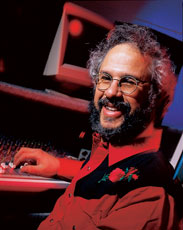|
|
Lessons Learned |
November 2001 |
|
One of the important ways the music industry differs from most ’Äúmainstream’Äù industries is the relatively low emphasis on academic training. That is typical of industries that involve or support the creative arts. The tradition in the creative arts focuses more on studying with a mentor than on going to school, and even on the business side, many people learn their jobs by doing them.
People in the music industry just care about getting the job done ’Äî whether they produce or perform music, manufacture music products, run a talent agency, or teach private lessons. You get most jobs in this industry based on networking, experience, and a proven ability to deliver. After all, if you must have that special guitar part on your new song, you don't care whether the guitarist has a music degree. In America most audio engineers have no degree in audio engineering; often they have no degree at all. Many successful manufacturer marketing reps came up through the music-store ranks and have no schooling in marketing.
That's less common in mainstream businesses that aren't directly related to the creative arts, especially in the professions. Attorneys, doctors, accountants, and schoolteachers cannot practice unless they've been certified. For that matter, truck drivers need a license to drive big rigs, and many attend truck-driving school.
On the positive side, the lack of emphasis on formal training promotes the set of values often dubbed the American Dream. If you develop your abilities, work hard, and take care of business, you can be successful.
On the downside, we in the music business put up with a certain amount of bumbling and reinventing the wheel. We also see surprisingly unprofessional behavior; our industry often tolerates an amazing degree of flakiness and unreliability. Admittedly, we're in an industry filled with musicians, which means we have a disproportionate number of free spirits and creative wackos. That can make things interesting and entertaining, but it also can be frustrating. Although not a requirement, academic training is nevertheless highly desirable in our industry.
Mentoring is great, but a full academic education (which should include mentoring) adds considerable value. A well-trained musician is more likely to be able to step in and give you what you want with minimal fuss. Audio engineers with degrees in engineering understand why sound and recording equipment works the way it does and how to use that knowledge to get the desired results. Well-educated people often have an encyclopedic knowledge of what has been successful and unsuccessful in the past, reducing bumbling.
Perhaps most important, you need to know how to be a professional. Music and business programs can help, but even they don't always teach you how to be a good leader ’Äî or follower. You might need to learn those lessons on your own.
The music industry's openness has let many of us thrive regardless of our academic backgrounds, which is great. But if we don't have the advantages of formal training, we need to address the drawbacks with self-education and an understanding that something has been lost as well as gained by our informal approach. |
